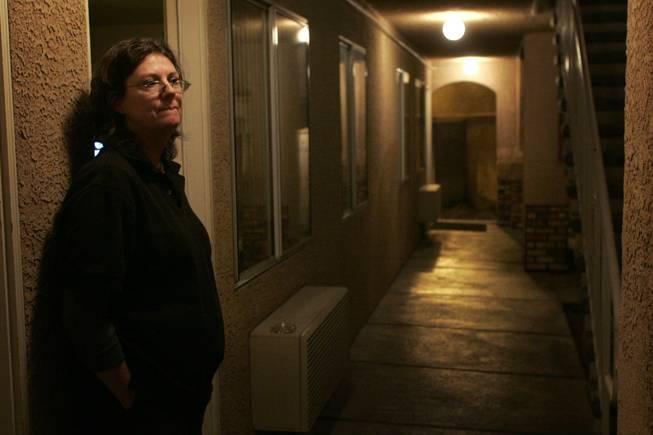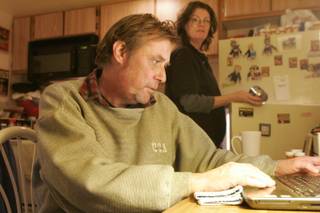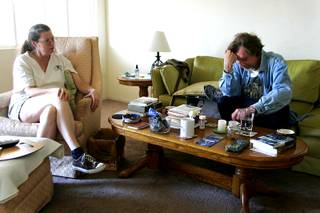
Sam Morris / Las Vegas Sun
Lela Michael steps outside the apartment she shares with Rodger Jacobs and watches the goings on in the parking lot Thursday, December 2, 2010.
Sunday, Dec. 5, 2010 | 2 a.m.
The New Homeless
The New Homeless: Part 3
Freelance writer Rodger Jacobs and his girlfriend Lela Michael moved to Las Vegas from California in 2007 to take care of Rodger's terminally ill mother, and when the recession hit, they ran out of money to move back home. The couple is now living in a weekly rate residential hotel after being kicked out of their North Las Vegas home in August when they fell behind on their rent. You can see their court hearing in the Sun's Part 1 video. After their move, which the Sun documented in the Part 2 video, Rodger set a goal of moving back to Los Angeles by November 15, 2010. Now past their deadline and still living in the Budget Suites residential hotel, Rodger reflects on what's keeping them here and his new routine of work, walks and the occasional margarita, and Lela has begun volunteer work on a mission to improve her self-esteem for what she hopes will be a happy reunion with her family in California sometime in the future.
This is the third installment by freelance writer Rodger Jacobs, sharing his experience as one of the new homeless in the Great Recession.
The long columns of slot machines are blinking and twinkling and beckoning with their tinny carnival tunes. But only a haunting memory remains of the fun seekers who flocked to this popular off-Strip casino before the Great Recession swept in and devastated home values, savings and retirement accounts, jobs, futures, dreams, security.
It is 4 o’clock on a breezy weekday afternoon. As I settle onto a stool at the horseshoe-shaped bar at the sports book at the Fiesta on North Rancho, a dull ache in my arthritic joints warns me of impending winter. Enduring another season of Southern Nevada’s harsh wintry wind and frigid biting cold is a prospect I am prepared to move mountains to avoid.
Even more stinging has been the reaction by many readers to my first essay on being homeless in Las Vegas — mean-spirited remarks that have fueled my decision to leave town. We had arrived here from California in 2007 to care for my ailing mother, at a time when my freelance writing business was following a trajectory parallel to the recession. After her death, we moved to an apartment for two years and then to a North Las Vegas rental home. But we couldn’t afford the cost of maintaining the house that we were contractually saddled with, and in September, under threat of eviction, we moved to a small two-room affair at Budget Suites. Along the way, we have shed most of our possessions; the rest is in a 10-by-10 storage unit, waiting to be redeemed.
We had hoped that by now we would have returned to Los Angeles. But Lela, my girlfriend, and I are still here; relocating even just to L.A. requires more capital than we have. We get by on my Social Security Disability payments of $926 a month (after a $100 monthly deductible for Medicare) and occasional freelance writing and editing assignments. At the urging of Three Square, where Lela volunteers weekly, she recently applied for federal grocery assistance.
We did receive generous donations from a few readers after I first wrote about our homelessness — money that has been spent on groceries, rent, transportation, laundry, medical expenses and IRS payments.
But any warmth of kindness was lost to judgmental creatures wrapped in their conservative ideology and intoxicated by their own venomous rhetoric. (One reader, Ron, called me a “lazy, lazy lazy loser” and worse.) As journalist and author Michael Scott Moore (“Sweetness and Blood”) wrote on his website Radio Free Mike: “The worst part is that the Sun has uncovered a new and virulent strain of American unfeeling for the unfortunate.”
More than the tale of my plight itself, the vicious online response to the New Homeless series (particularly in Part One) became the story for the press beyond Nevada’s borders. And that will be my take-away from this unwanted experience: how others react to a stranger’s homelessness. During Channel 3’s recent Holiday Helping Hand Drive, Clark County Commissioner Steve Sisolak summed it up best when he said, “Societies are judged by how they respond to those in need.” Indeed, the citizens of Las Vegas have been judged by the shrill voices of a very vocal minority.
In the popular New York-based Web daily The Awl, editor Choire Sicha, in an Aug. 30 posting titled “Why Is American Selfishness So Widespread Now?” observed that reaction to my story serves as “a reminder of the American lack of empathy … the (comments) went from awful to judgmental to trashing to witch hunt.”
On Oct. 1, at the Working America blog, a community affiliate of the AFL-CIO, New Hampshire writer Susan Bruce attempted to make sense of the outrage: “The lack of compassion is troubling but the level of anger is even more disconcerting. I suspect that the anger some people have for the homeless is fueled by their own fears that they are only a paycheck or two away from being homeless themselves.”
•••
I order a $1 frozen margarita from the bartender and the frigid concoction arrives in a 12-ounce plastic cup. Most patrons who take up space at the bar are transfixed by either the video slots embedded in the bar or the daily betting sheets. I always ignore both costly pastimes and choose to occupy my time reading a book or working in a journal.
A few afternoons a week this sports bar that largely caters to locals is my refuge from the cramped, dark room at the Budget Suites that is almost impossible to breathe life into. It is not a home. It is a way station. (I freely choose to make this admission of my visits to the sports bar because I have nothing to lose; more than one commenter harshly condemned me for spending one dollar on bottled water, so go ahead and make hay with this; there’s nothing I can say or do at this point that will not be met with scornful criticism; stone throwers are nothing if not predictable, though their aim is often errant and lacking in grace.)
I take a sip of the margarita and pull my black journal out of the canvas tote bag slung over the back of the stool. Poring over my notes for the third installment of the New Homeless, I linger on a quote extracted from “The Air-Conditioned Nightmare,” Henry Miller’s 1939 survey of the American physical and moral landscape: “We loathe one another. We hate what we look like when we look into another’s eyes.”
I cannot say it any better than Miller did, though the author outdoes himself in another quote also hastily scratched in red ink in the journal’s margins: “What is the most steadfast condition of life? Cruelty to one another. Man torturing man is a fiend beyond description.”
My occupation also came under the hateful scrutiny of the Sun’s readers with many suggesting that I must be a failure as a writer because I don’t share the success of Stephen King. Just because fame hasn’t conferred any external interest in my work does not make me a failure by any stretch of the imagination. Shall we confer the word “failure” upon a plumber, carpenter or an architect whose hard work did not allow them to open their own business? Shall we deem an exemplary chef a failure for never seeing his name above the marquee of a trendy bistro?
Henry Miller notes that writers “begin to develop, to reveal their true personality, after passing the age of forty-five” and that the scribe’s life is one of unceasing labor, study and observation, not a leisurely life, as many suggested, of three-hour lunches while watching cartoons and sleeping until noon. In Patrick Marnham’s biography of the prolific Belgian novelist Georges Simenon, “The Man Who Wasn’t Maigret,” the author quotes one of the writer’s many lovers, who told the biographer: “I was very impressed because he was a writer and I no idea what being a writer meant. I thought they lived in a chateau and walked around all day in a silk dressing-gown. I didn’t realize they had to work hard like other men.”
And before another self-righteous paragon of integrity regurgitates theological dogma in my direction, consider the wisdom of a true theologian, Joseph Speranzella, a man who holds degrees in biblical studies and Christian counseling, who addressed my articles in the Norfolk Catholic Examiner on Sept. 26: “The plight of the new homeless often includes ridicule and insensitivity. When I found myself in a transient situation, I was amazed at how quickly some Christians whose love is ‘always patient and kind’ (1 Cor. 13:4) lost patience and turned unkind … Many will take the low road and, instead of giving compassion, will make complaint. So be it. It is not for me to judge (Rodger), nor those who judged him. It is mine only to pray and be moved to action.”
If not for those who were generously “moved to action,” our transition from lease holders to a more uncertain lifestyle could have been a much uglier story. And there has been forward momentum since the second installment of this series ran in late September: A colleague has offered to underwrite the cost of movers when we are ready; my story has also gained a lot of traction in foreign media.
And two publishers in New York have expressed interest in a book proposal, “Shakespeare’s Hand is Missing,” based on this series of articles and features I have penned elsewhere on the marginalization of writers and artists in our current culture (think George Orwell’s “Down and Out in Paris and London” with a contemporary spin). But to finish the book, I need to get back to L.A., where I have a support network and greater opportunities for supplemental income to sustain the writing. When the move can become a reality is uncertain. As Orwell writes in the aforementioned work, “The great redeeming feature of poverty is it annihilates the future.”
•••
It is near 5 o’clock and I briefly consider ordering a second margarita (for one dollar you wouldn’t expect a cocktail to pack such a potent punch but it does). But I don’t need another drink nor do I really want one; what I’m doing is trying to forestall returning to that small room. After another moment of hesitation, I pack my journal and cigarette case into the canvas bag, rise, sling the bag over my shoulder, grab my cane and start for the exit.
The mandate of the writer is to create order from chaos. As for an orderly plan to return to L.A. before the full onset of winter, all I have are scraps of thoughts and ideas that do not add up to a cohesive whole. It is difficult to leave much thought for anything else when you’re struggling to figure out where your next rent payment or meal is coming from.
That’s the great, anxiety-producing paradox we’re confronted with constantly: How to meet our daily needs while we must remain in Las Vegas (where we don’t want to be and, according to many who commented, where we are not wanted) and how to set aside enough money to carry us across the desert and into a suitable living space with reserves for deposits and at least two months of rent.
But potential is the most elastic of human qualities and as has happened repeatedly in the past, my skill and potential as a writer will expand to meet my needs. It’s not a question of “how” or “if” but when.




Join the Discussion:
Check this out for a full explanation of our conversion to the LiveFyre commenting system and instructions on how to sign up for an account.
Full comments policy